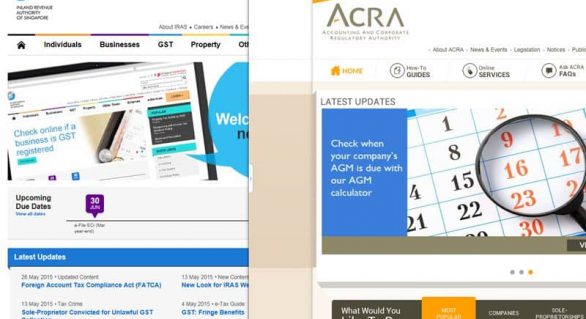
Singapore continues to be a preferred destination for entrepreneurs, multinational companies and start-ups. Known for its enterprise-friendly environment, it offers tax incentives, government fund assistance schemes, productive workforce, and robust intellectual property protection. The registration process is easy and uncomplicated. Start-ups can be registered in a day as long as the requirements are complete.
Statutory compliance is imperative once a business is registered in Singapore. Failure to comply with requirements may lead to summons, fines and other penalties. Ensure your business is on track by taking note of these important dates:
1. Financial Year End (FYE)
Every company in Singapore is required to determine its Financial Year End (FYE). The FYE refers to the end of a particular company’s accounting period. In the case of subsidiary company, the FYE is usually the same with the parent company’s FYE to streamline filing responsibilities.
Change in FYE
In the event that a company changes its FYE, it is required to notify both the Accounting and Corporate Regulatory Authority (ACRA) through BizFile and Internal Revenue Authority of Singapore (IRAS) through myTax Portal.
2. Estimated Chargeable Income (ECI)
The ECI is an estimation of a company’s chargeable income for a particular Year of Assessment (YA). Capital gains and fixed asset disposal are not included in the computation for ECI.
All companies registered in Singapore must file its ECI except those that were given a waiver of the requirement to file ECI. The Inland Revenue Authority of Singapore (IRAS) usually provides companies with a notification or reminder to file its ECI during the last month of its financial year. Those who file their ECI in a timely manner are entitled to pay their taxes in instalments
When should you file your company’s ECI?
The ECI must be filed three (3) months before the company’s Financial Year End.
3. Annual General Meeting (AGM)
The Annual General Meeting (AGM) is a mandatory yearly meeting of company shareholders. The company’s financial standing is one of the key points of discussion during the meeting. Company Directors are expected to provide an unbiased, clear and honest presentation of the company’s accounts during the period in review.
When should you hold your company’s AGM?
The first AGM must be held within eighteen (18) months after a company’s incorporation.
- For example, you have incorporated your business on January 2014, you must hold your first AGM within on or before July 2015.
Companies must ensure that succeeding AGMs are conducted with an interval that is no more than fifteen (15) months.
- Following our earlier example, if you conduct your AGM on or before July 2015, your subsequent AGM must be held on or before October 2016.
Note that the company’s financial accounts must be updated six (6) months before the scheduled AGM. If a company fails to hold its AGM, a summons from ACRA may be issued to the Company Director.
Singapore AGM Calculator
Uncertain when your company’s next AGM in Singapore should be? Simply use our free online tool that lets you know when you should schedule your next AGM. Check out our Singapore AGM Date Calculator.
4. Annual Return Filing
Any company that is registered in Singapore is mandated to file their Income Return. There are two ways for a company to file its Annual Return: paper filing and e-filing. Electronic transactions are encouraged when it comes to the services that government agencies offer. Hence, companies that file their income returns via e-filing can benefit from an extended deadline. All companies have at least eleven (11) months to file their income return.
Paper Filing
The deadline for paper filing is November 30.
E-filing
The deadline for e-filing is December 30. Companies can start e-filing from June 2, 2015.
Need assistance in complying with these requirements?
Don’t miss any of these important deadlines or risk penalties. Ensure statutory compliance by engaging our services. We can assist you from preparation to the submission of your documents; we provide a complete range of Accounting and Tax Services for small and medium-sized enterprises in Singapore. Get in touch with us to schedule a FREE consultation with one of our specialists.







